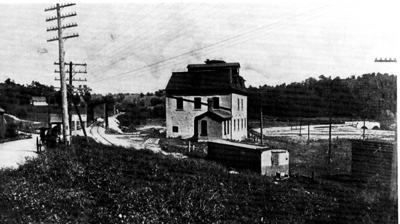Encyclopedia Dubuque
"Encyclopedia Dubuque is the online authority for all things Dubuque, written by the people who know the city best.”
Marshall Cohen—researcher and producer, CNN
Affiliated with the Local History Network of the State Historical Society of Iowa, and the Iowa Museum Association.
ROCKDALE MILL: Difference between revisions
No edit summary |
No edit summary |
||
| Line 1: | Line 1: | ||
ROCKDALE MILL. One of the first mills to be constructed within the present borders of Iowa. Built in 1834 or 1835 by David Hutton and his son, William, the mill was sold as "The Catfish Mills" on April 25, 1839. At this time not a bushel of wheat was grown in Dubuque County, and only a few farms were being started along the [[MILITARY ROAD]] south of Dubuque. | [[Image:imp222.jpg|left|thumb|350px|Constructed in 1834 or 1835, the Rockdale Mill was one of the first constructed in Iowa. It was used in one form or another until 1927. Photo courtesy: John Klauer, Port of Dubuque Visitor.]]ROCKDALE MILL. One of the first mills to be constructed within the present borders of Iowa. Built in 1834 or 1835 by David Hutton and his son, William, the mill was sold as "The Catfish Mills" on April 25, 1839. At this time not a bushel of wheat was grown in Dubuque County, and only a few farms were being started along the [[MILITARY ROAD]] south of Dubuque. | ||
In 1840 the mill was sold again. James Pratt and Walter Manson owned the controlling interest and operated the mill for twenty-five years. It was Pratt and Manson who coined the name "Rockdale Mills" for their business and replaced the original log building with a frame structure four stories high. The mill's capacity was approximately sixty barrels daily or ninety thousand bushels annually. A stone addition to the mill increased the production to 412,500 bushels annually. Processed wheat in 1855 sold for between forty and sixty cents per bushel in [[GOLD]]. | In 1840 the mill was sold again. James Pratt and Walter Manson owned the controlling interest and operated the mill for twenty-five years. It was Pratt and Manson who coined the name "Rockdale Mills" for their business and replaced the original log building with a frame structure four stories high. The mill's capacity was approximately sixty barrels daily or ninety thousand bushels annually. A stone addition to the mill increased the production to 412,500 bushels annually. Processed wheat in 1855 sold for between forty and sixty cents per bushel in [[GOLD]]. | ||
Revision as of 18:39, 15 January 2009
ROCKDALE MILL. One of the first mills to be constructed within the present borders of Iowa. Built in 1834 or 1835 by David Hutton and his son, William, the mill was sold as "The Catfish Mills" on April 25, 1839. At this time not a bushel of wheat was grown in Dubuque County, and only a few farms were being started along the MILITARY ROAD south of Dubuque.
In 1840 the mill was sold again. James Pratt and Walter Manson owned the controlling interest and operated the mill for twenty-five years. It was Pratt and Manson who coined the name "Rockdale Mills" for their business and replaced the original log building with a frame structure four stories high. The mill's capacity was approximately sixty barrels daily or ninety thousand bushels annually. A stone addition to the mill increased the production to 412,500 bushels annually. Processed wheat in 1855 sold for between forty and sixty cents per bushel in GOLD.
The success of the Rockdale Mills broke the monopoly of St. Louis on trade along the Upper Mississippi. Flour equal in quality to the St. Louis, Missouri, variety was produced in Rockdale for one-fourth the cost. This success led to the establishment of other mills. For a time Dubuque enjoyed a monopoly on everything in the provision market for settlers north into Minnesota. Dubuque County continued its control over the Minnesota flour trade until 1858 when Red Wing, Minnesota, became an exporter of flour rather than a buyer.
Dubuque mills, including Rockdale, developed eastern markets for flour until July 4, 1876, when the ROCKDALE FLOOD temporarily ended the milling business in Rockdale during a night of terror. The mill burned to the ground in 1878, but the site was purchased by Thomas Watters, Jr. He rebuilt the mill, in which his grandfather had been an original partner, and changed the name to the South Dubuque Mill.
On October 1, 1885, the mill was purchased by J. F. Gondolfo. With repairs estimated at five thousand dollars, the mill was again producing such brands of flour as "Crown Jewel," "Gold Crown," and "Choice Patent" at a rate of one hundred ten barrels daily. In 1901 the mill was leased by Joseph J. NAGLE to a corporation that operated the plant until 1915 when competition led it to be shut down. It was briefly used as the Moes Dairy barn until 1927 when it was destroyed by fire.


